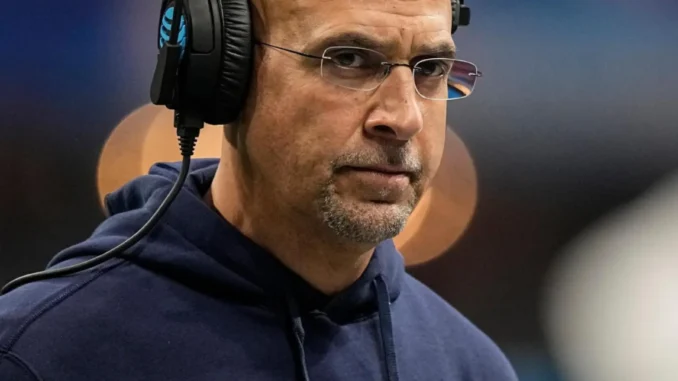
BREAKING: James Franklin Boycotts NCAA Pride Night—“It Should Be About Football, Not Politics”
Penn State Head Coach James Franklin has ignited a firestorm across the college football landscape after announcing he will boycott the NCAA’s upcoming Pride Night event. The longtime Nittany Lions leader made the bold declaration during a press conference Monday afternoon, stating, “On the field, it should be about football, not politics or agendas.” The statement was met with stunned silence in the room, but that silence didn’t last long—within minutes, social media exploded with reactions both praising and condemning Franklin’s stand.

Franklin’s announcement marks one of the most high-profile acts of resistance to the NCAA’s recent initiative aimed at promoting inclusivity and LGBTQ+ awareness in college athletics. Pride Night, a celebration that’s been incorporated into several NCAA programs across sports, is intended to foster visibility, safety, and support for LGBTQ+ student-athletes and fans. Critics, however, argue that such events risk politicizing sports—an arena many believe should remain neutral and focused solely on athletic performance. Franklin, whose program has traditionally supported community initiatives, made it clear that this decision wasn’t rooted in hate, but in principle. “Everyone has a right to feel welcome. But when we start turning game day into political theater, we lose the essence of competition.”
The backlash has been swift. LGBTQ+ advocacy groups, student organizations, and fellow coaches have voiced disappointment, calling Franklin’s decision tone-deaf and harmful to vulnerable athletes. “Visibility saves lives,” one Penn State student tweeted, adding, “Franklin just told thousands of us we don’t belong.” Some even speculated that this stance could affect Penn State’s recruiting efforts, especially among players who prioritize inclusive team environments. On the flip side, conservative commentators and public figures hailed Franklin’s comments as courageous, praising him for “standing up against the forced messaging infiltrating sports.”
This is not the first time the role of activism in sports has come under scrutiny. From NFL players kneeling during the national anthem to the NBA’s social justice slogans on jerseys, America has long debated where the line between sports and social issues lies. Franklin’s move adds fresh fuel to that ongoing conversation. For many, it’s a reminder that the gridiron is no longer just about touchdowns and tackles—it’s also become a stage for broader cultural clashes. Whether you view that as progress or distraction likely depends on your worldview.
As the NCAA and Penn State prepare for the fallout, one thing is certain—James Franklin’s stance has shifted the spotlight from Saturday’s game plan to a national debate on identity, inclusion, and what we want sports to represent. The coach insists his motives are pure: “This isn’t about exclusion. It’s about clarity. My job is football.” But in today’s climate, every statement echoes louder than intended. Whether Franklin’s boycott becomes a trend or a cautionary tale remains to be seen.
Leave a Reply